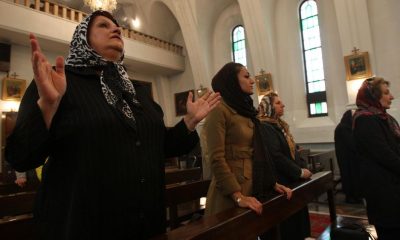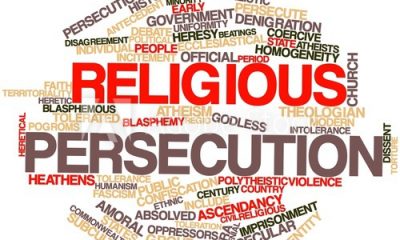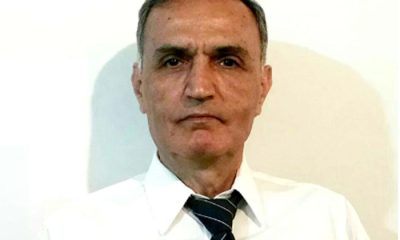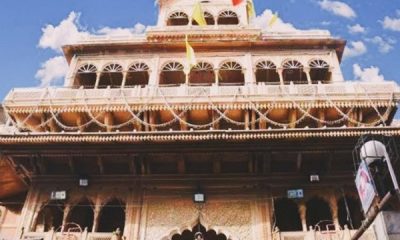world news
Iranian Christians faced sixfold increase in prison sentences in 2024: report
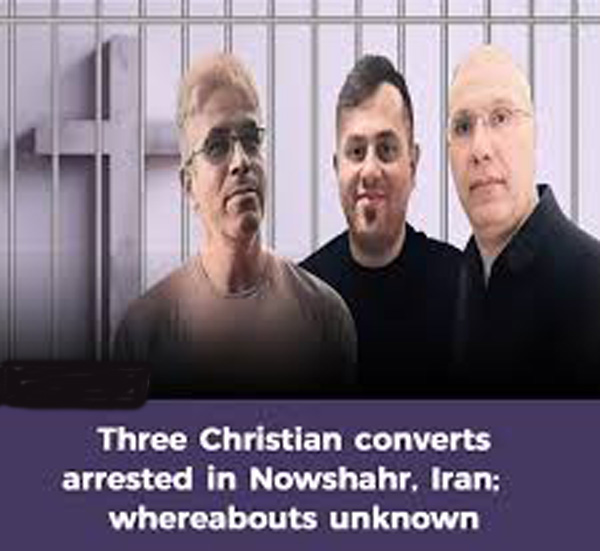
Three Christians rearrested for their faith in Iran were subjected to torture and asked to write letters renouncing their belief in Jesus amid the reality of a sixfold increase in prison sentences for Christians in the Islamic Republic in 2024, a new report states.
Article 18, a London-based religious freedom nongovernmental organization, released an annual report this month chronicling rights violations against Christians in Iran.
The report, titled “The Tip of the Iceberg” and released in partnership with Open Doors, Christian Solidarity Worldwide and Middle East Concern, found that Christians in Iran were sentenced to a combined total of 250 years in prison in 2024, a sixfold increase compared to 2023’s report.
According to the document, 96 Christians were sentenced to a combined 263 years in prison, 37 years of internal exile and nearly $800,000 in fines.
“At least 139 Christians were arrested in Iran in 2024 on account of their religious beliefs or activities, 80 were detained and 77 were charged,” Article 18 stated in the latest report. “At the end of 2024, at least 18 Christians were still serving sentences related to their faith. There were also reports of detained Christians being physically tortured.”
To address cases that often go unreported, the report includes details on the prosecution of Jahangir Alikhani, Hamed Malamiri and Gholam Eshaghi. They were arrested last year by agents with the Islamic Revolutionary Guard Corps. The Ministry of Intelligence had previously arrested the three, along with 20 others, in December 2023.
IRGC agents rearrested the men and took them to a detention center in Sari, where they were denied access to a lawyer, according to the report. The Christians faced charges of “propagating a religion contrary to Islam” and “collaborating with foreign governments,” according to a November 2024 Article 18 report.
The three were released on Nov. 17, 2024, on bail of 1 billion tomans, which would cost $15,000.
Before their release, the three men were subjected to physical and psychological torture during prolonged interrogations. They were told to write letters renouncing their faith and apologize for their actions.
“On the day of their release, another member of the group, Javad Amini, was rearrested and transferred to the Sari detention centre,” the report states. “Mr Amini’s wife, Farzaneh Ahmadi, went home to discover it ransacked, and minutes later received another unwelcome visit from the agents, who claimed they were looking for her husband’s phone and Bibles.”
“The agents later returned for a third visit and confiscated several Bibles and other Christian books, as well as Mr. Amini’s notebooks related to his study of Christian theology,” the document continued.
Agents with the Ministry of Intelligence and IRGC interrogated Amini’s wife during his detention, subjecting her to “severe psychological pressure.” Amini and two other Christian converts were released on Nov. 27, 2024, on bail of 1 billion tomans ($15,000).
Before their release, Amini, Alikhani, Malamiri, and Eshaghi and eight others went through a trial at Branch 102 of the Criminal Court of Nowshahr, according to the Article 18 joint report. Prosecutor Mohammad Reza Ebrahimi said in the indictment that those on trial had identified themselves as Christians in their defense.
As the prosecutor wrote, “And this is supported by the messages exchanged in their phones,” as well as through the “Gospels and other Christian literature found in their possession.” The prosecutor argued that the individuals were guilty of a crime because they had set up groups to teach about Christianity.
The outcome of the trial remained unreported at the end of 2024, according to the Article 18 joint report.
The confiscation of Christian properties and the targeting of their finances is another trend highlighted by the watchdog groups. IRGC intelligence agents would question arrested Christians about whether they received any funding from abroad.
“Each arrest was carried out by IRGC intelligence agents, who sought to charge them under a provision within the amended Article 500 of the Islamic Penal Code, which calls for the maximum punishment of up to 10 years’ imprisonment in cases where the individual has received ‘financial or organisational help from outside the country,'” the report notes.
“The Iranian government seems to have intensified its efforts to isolate and financially undermine the Christian community as part of a broader strategy to suppress its growth and influence,” the report states.
“Making financial donations, charitable offerings, or paying tithes to support church activities are standard practices for Christians worldwide, but such activities have been criminalised by Iran’s Revolutionary Courts.”
Sources:Christian Post
world news
Sudanese authorities arrest, torture 7 displaced Christians
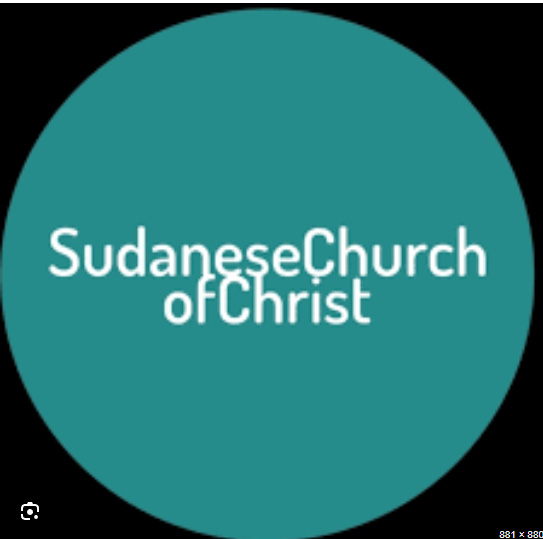
South Sudan — Intelligence agents of the Sudan Armed Forces (SAF) on Jan. 14 arrested and tortured at least seven Christians in Shendi, about 150 kilometers (93 miles) northeast of Khartoum, sources said.
The members of the Sudanese Church of Christ had sought refuge in areas controlled by the SAF from the military fighting in Khartoum, but upon arrival in Shendi, River Nile state, they were arrested by personnel from Military Intelligence, according to the Sudanese Christian Youth Union.
Military Intelligence agents accused the Christians of supporting the rival paramilitary Rapid Support Forces (RSF) and receiving stolen money, with the Christians denying both allegations. The youth union asserted that the false accusations were an excuse to arrest the Christians, and an attorney following the case said authorities tortured them into confessing.
The Christian attorney, Shinbago Mugaddam, said the seven young Christians were denied legal aid, tortured and taken to a sham trial on the same day as their arrest.
“They were arrested by the army intelligence and were subjected to beatings and interrogations,” Mugaddam, following the case from another country as a refugee from the war, told Morning Star News. “A case was opened against them where the complainant and the witnesses for the accusation were all members of the armed forces. The court did not ask them whether they needed a lawyer or had witnesses to deny this incident, knowing that they were beaten and forced to confess and provide evidence against themselves.”
The accusers and the witness were all from Military Intelligence, and they forced the Christians to plead guilty against their will, he said.
“These youths were tried under Article 174 of the Sudanese Criminal Code of 1994 relating to theft in a summary trial in the Shendi Court, River Nile state, where the conditions for a fair trial were not met,” Mugaddam said.
The Union of Sudanese Christian Youth condemned the arrests and called for their immediate release. Describing the arrests as a violation of human and religious rights in Sudan, the body urged all rights groups, regional and international organizations to intervene and protect those who have been jailed without evidence.
“We in the Sudanese Christian Youth Union hereby condemn these violations that are based on the religion, color and ethnicity” reads the statement issued on Turesday (Jan. 21).
In October, 26 Christians were arrested by Military Intelligence in Shendi after fleeing areas under RSF control in Khartoum.
Sudan’s military-led government in May approved a law restoring broad powers and immunities to intelligence officers that had been stripped after the ousting of President Omar al-Bashir in April 2019. The General Intelligence Service (GIS) Law (2024 Amendment) empowers intelligence officers to summon and interrogate individuals, conduct surveillance and searches, detain suspects and seize assets, according to the Sudan War Monitor.
The amendment granted extensive immunity, shielding agents from criminal or civil prosecution without the approval of the head of GIS. In capital punishment cases, it gave the director authority to form a special court.
“Any act committed by any member of the agency in good faith during or because of the performance of his job duties, or the performance of any duty imposed on him, or from any act issued by him under any authority authorized or granted to him under this law, shall not be considered a crime,” the law’s Article 52 states, according to the Sudan War Monitor.
Sudan was ranked No. 5 among the 50 countries where it’s most difficult to be a Christian in Open Doors’ 2025 World Watch List (WWL), down from No. 8 the prior year.
Conditions in Sudan worsened as civil war that broke out in April 2023 intensified. Sudan registered increases in the number of Christians killed and sexually assaulted and Christian homes and businesses attacked, according to the WWL report.
“Christians of all backgrounds are trapped in the chaos, unable to flee. Churches are shelled, looted and occupied by the warring parties,” the report stated.
Since April 2023 militants of the paramilitary RSF have been battling the SAF, and each Islamist force has attacked displaced Christians on accusations of supporting the other’s combatants.
The conflict between the RSF and the SAF, which had shared military rule in Sudan following an October 2021 coup, has terrorized civilians in Khartoum and elsewhere, killing tens of thousands and displacing more than 12.36 million people within and beyond Sudan’s borders, according to the U.N. Commissioner for Human Rights (UNCHR).
The SAF’s Gen. Abdelfattah al-Burhan and his then-vice president, RSF leader Mohamed Hamdan Dagalo, were in power when civilian parties in March 2023 agreed on a framework to re-establish a democratic transition the next month, but disagreements over military structure torpedoed final approval.
Burhan sought to place the RSF — a paramilitary outfit with roots in the Janjaweed militias that had helped former strongman Omar al-Bashir put down rebels — under the regular Army’s control within two years, while Dagolo would accept integration within nothing fewer than 10 years.
Both military leaders have Islamist backgrounds while trying to portray themselves to the international community as pro-democracy advocates of religious freedom.
Sudan had dropped out of the top 10 of the WWL list for the first time in six years when it first ranked No. 13 in 2021.
Following two years of advances in religious freedom in Sudan after the end of the Islamist dictatorship under Bashir in 2019, the specter of state-sponsored persecution returned with the military coup of Oct. 25, 2021. After Bashir was ousted from 30 years of power in April 2019, the transitional civilian-military government had managed to undo some Sharia (Islamic law) provisions. It outlawed the labeling of any religious group “infidels” and thus effectively rescinded apostasy laws that made leaving Islam punishable by death.
With the Oct. 25, 2021, coup, Christians in Sudan feared the return of the most repressive and harsh aspects of Islamic law. Abdalla Hamdok, who had led a transitional government as prime minister starting in September 2019, was detained under house arrest for nearly a month before he was released and reinstated in a tenuous power-sharing agreement in November 2021.
Hamdock had been faced with rooting out longstanding corruption and an Islamist “deep state” from Bashir’s regime — the same deep state that is suspected of rooting out the transitional government in the 2021 coup.
The U.S. State Department in 2019 removed Sudan from the list of Countries of Particular Concern (CPC) that engage in or tolerate “systematic, ongoing and egregious violations of religious freedom” and upgraded it to a watch list. Sudan had previously been designated as a CPC from 1999 to 2018.
In December 2020, the State Department removed Sudan from its Special Watch List.
The Christian population of Sudan is estimated at 2 million, or 4.5% of the population of more than 43 million.
Sources:Christian Post
world news
Boko Haram’s Latest Attacks Displace Thousands of Christians in Nigeria
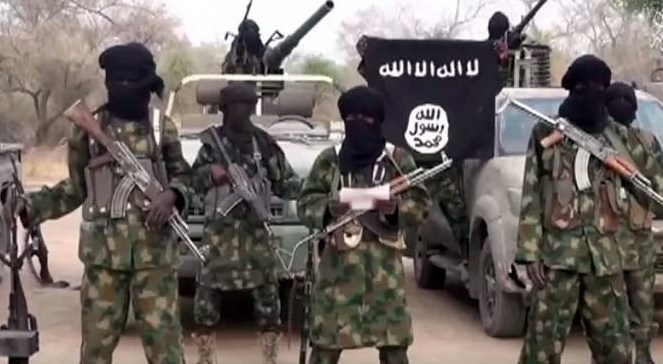
Nigeria — Boko Haram is escalating attacks on Christian communities in Chibok, Borno state, displacing more than 4,000 Christians in recent days. In a series of coordinated raids, Boko Haram targeted the Christian villages of Njila, Banziir, Shikarkir, and Yirmirmug, burning homes, torching churches, and killing five people.
During the most recent attack on Monday, terrorists descended on Shikarkir and Yirmirmug in the early morning, displacing more than 1,500 residents.
Eyewitnesses reported that Boko Haram militants targeted Christians during these raids, intimidating them and demanding they convert to Islam or face death. The violence destroyed Ekklesiyar Yan’uwa, a church, and the loss of livestock, food supplies, and livelihoods.
“We are living in fear,” said Ibrahim Yana, a farmer who fled Shikarkir. “They burned down our church and homes. Many of us have lost everything.”
Boko Haram, officially known as Jama’atu Ahlis Sunna Lidda’awati wal-Jihad, has waged a violent insurgency since 2009, targeting Christians, moderate Muslims, and government institutions in its quest to establish an Islamic caliphate. The group gained global infamy for its 2014 abduction of 276 schoolgirls in Chibok, an event that sparked international outrage and the #BringBackOurGirls movement.
Since then, Boko Haram has orchestrated numerous atrocities, including the killing of tens of thousands of civilians, the displacement of more than 2.5 million people, and the destruction of churches, schools, and entire communities across Nigeria’s northeast.
In recent years, Boko Haram’s attacks have become increasingly brutal, with Christian communities bearing the brunt of the violence. The group frequently targets church gatherings, burns down places of worship, and murders Christians who refuse to renounce their faith.
The Borno State Government has condemned the latest attacks, with Governor Babagana Umara Zulum pledging to enhance security measures. “I call on the people of Chibok not to be intimidated,” he said. “The government will work tirelessly to prevent further attacks.”
Sources:persecution
world news
തായ്ലാന്ഡില് സ്വവർഗ വിവാഹത്തിന് അനുമതി; നിയമം പ്രാബല്യത്തിൽ വന്നു

തായ്ലാന്ഡില് സ്വവർഗ വിവാഹത്തിന് അനുമതി, നിയമം പ്രാബല്യത്തിൽ വന്നു. സ്വവർഗ വിവാഹ നിയമം പ്രാബല്യത്തിൽ വന്നു. ഇതോടെ നിയമപരമായി നിരവധി സ്വവർഗ ദമ്പതികൾ വിവാഹിതരായി. തായ് അഭിനേതാക്കളായ അപിവത് സയ്റീയും സപ്പന്യോയും ബാങ്കോക്കിലെ രജിസ്ട്രി ഓഫീസിൽ വിവാഹിതരായി, വിവാഹ സർട്ടിഫിക്കറ്റ് കൈമാറി.
ദശകങ്ങളോളം ഞങ്ങൾ പോരാടി, ഇന്ന് ശ്രദ്ധേയമായ ദിവസമാണെന്ന് ഇരുവരും പറഞ്ഞു. ഇതോടെ തായ്വാനും നേപ്പാളിനും ശേഷം സ്വവർഗവിവാഹം അംഗീകരിക്കുന്ന ഏഷ്യയിലെ ഏറ്റവും വലിയ രാജ്യമായി തായ്ലൻഡ് മാറി. പുരുഷന്മാർ, സ്ത്രീകൾ, ഭർത്താക്കന്മാർ, ഭാര്യമാർ എന്നതിനുപകരം ലിംഗ-നിഷ്പക്ഷ പദങ്ങൾ ഉപയോഗിക്കും.
കൂടാതെ ട്രാൻസ്ജെൻഡറുകൾക്ക് വിവാഹം കഴിക്കാനും നിയമം അനുവദിക്കും. എല്ലാ വിവാഹിതരായ ദമ്പതികൾക്കും ദത്തെടുക്കലും അനന്തരാവകാശവും നൽകും. നിയമപ്രകാരം ലെസ്ബിയൻ ദമ്പതികളായ സുമലി സുഡ്സൈനെറ്റ് (64), തനഫോൺ ചോഖോങ്സുങ് (59) എന്നിവരാണ് ആദ്യമായി വിവാഹിതരായത്. പരമ്പരാഗത വിവാഹ വസ്ത്രങ്ങൾ ധരിച്ച നിരവധി ദമ്പതികൾ ബാങ്കോക്ക് പ്രൈഡ് സംഘടിപ്പിച്ച എൽജിബിടിക്യു സമൂഹ വിവാഹത്തിനെത്തി.
കഴിഞ്ഞ ജൂണിൽ നടന്ന ചരിത്രപരമായ പാർലമെൻ്റ് വോട്ടെടുപ്പിലാണ് സ്വവർഗ വിവാഹ ബിൽ പാസായത്. ഈ നിയമം സെപ്റ്റംബറിൽ രാജാവ് മഹാ വജിറലോങ്കോൺ അംഗീകരിക്കുകയും 120 ദിവസത്തിന് ശേഷം പ്രാബല്യത്തിൽ വരികയും ചെയ്തു.
Sources:azchavattomonline.com
Hundreds of LGBTQ+ couples married in Thailand Thursday as the kingdom became the third place in Asia to legalize same-sex unions. The decision carries serious economic potential in that country.
The new law came into effect on Thursday, following only Taiwan and Nepal in Asia. It also makes Thailand the first Southeast Asian nation to recognize same-sex marriage, in a region of several Muslim-majority nations where homosexuality is outlawed on religious grounds.
Now, in an administrative change that carries major consequences, the word “spouse” replaces “husband” and “wife” in statutes, unlocking access for same-sex couples to practical benefits previously only enjoyed by heterosexual marriages.
Those include the ability to adopt children, take out joint mortgages, pass on property after death, benefit from next-of-kin status and receive state benefits – as well as crucial medical rights to give consent on behalf of their partners in an emergency.
Across the country, from Krabi in the south to Chiang Mai in the north, couples married in registration ceremonies that ranged from intimate at local government offices to a mass wedding at a downtown shopping mall in Bangkok.
Thai national Rittigiat Subma married his Chinese partner, Xichen Lin, in Bang Rak district, Bangkok’s most popular district for marriage. Pride rainbow flags and umbrellas hung above the offices, while a three-piece band provided the soundtrack to the weddings.
“I’m so happy. It’s long overdue,” Rittigiat told VOA. “My partner and I can now take a loan together to buy a house, we can access other equal benefits and make big medical decisions for one another.”
“I can get a spouse visa after we register our marriage here and move to Australia with him for his work.”
Proudly holding the red-bound marriage certificate book, his spouse, Xichen Lin. said the pair – who are both 27 and work for tech firms – knew they wanted to get married within weeks of meeting each other.
“Had this bill not been passed there wouldn’t be a relationship for us, because one of the premises of our relationship is that we’re going to have a future.” With no legal possibilities for gay couples in China where same-sex marriage is illegal, he said Thai law has unlocked that possibility.
“We are able to live a normal life now just like a regular couple; we can tell the others that we are married … we can share assets and represent each other in legal circumstances.”
Despite the joy and celebration, there were notes of caution from LGBTQ+ advocates who say their equality efforts continue beyond the same-sex bill.
“The law may take effect today but that doesn’t mean discrimination against LGBTQ+ community has changed overnight,” said Tunyawaj Kamolwongwat, a lawmaker for the progressive People’s Party, and a key driver of the law change.
“There is a long journey ahead of us with other laws needing to catch up … now we have to follow up on an array of issues including pregnancy through assisted reproductive technologies, [and] foreign citizenship for LGBTQ+ partners …”
Prime Minister Paetongtarn Shinawatra has reaped the political dividends from the legal change, which follows years of delayed efforts to get same-sex marriage codified.
“With the power of love by all of you, today Thailand marks a historic day in making the world know that we embrace every kind of love, every gender that is a fundamental part of democracy,” Paetongtarn, now at the World Economic Forum in Davos, Switzerland, said in a prerecorded video message.
There are also big hopes for an economic bounce, with companies from insurance and mortgages to hotels keen to cash in on the so-called pink baht.
Paetongtarn’s government has put same-sex marriages under the kingdom’s “soft power” drive – alongside Thai pop music and movies – sensing an economic opportunity from a reputation for openness and hosting weddings and honeymoons in one of the world’s top tourist destinations.
A study by travel platform Agoda said that Thailand’s marriage equality legislation is set to deliver an additional 4 million international visitors per year and increase tourism revenue by nearly $2 billion annually – within two years after it is enacted.
Thai official data says around 9% of the population – or 4.4 million people – identify as LGBTQ+, representing a domestic marriage market of around $50 million.
Dujruedee Thaithumnus, a wedding consultant on the tourist haven of Koh Samui in the Gulf of Thailand, said the island was ready for the inflow of couples.
“It will boost the economy of the entire island … from musicians who play at weddings, to make-up artists and flower shops to photographers and hotels. The island is already packed as it is. I can’t imagine after the law change is official.”
-

 Travel8 months ago
Travel8 months agoയാക്കൂസ കരിഷ്മ:ഓല സ്കൂട്ടറിനേക്കാൾ വിലക്കുറവിൽ കുഞ്ഞൻ കാർ; സിറ്റി യാത്രകൾക്ക് ഇനി ഇവൻ മതിയാവും
-

 Movie2 months ago
Movie2 months agoFor KING + COUNTRY Stars’ Big Plan to Bring Message of Jesus, ‘Redemption of Humanity’ to People Across America
-
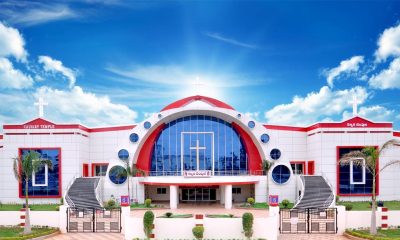
 National11 months ago
National11 months ago300,000-Member Indian Church to Plant 40 More Megachurches
-

 National11 months ago
National11 months agoനെയ്തേലിപ്പടി ക്രൂസേഡിന് അനുഗ്രഹീത സമാപ്തി
-

 Tech7 months ago
Tech7 months agoചിത്രങ്ങൾ എഡിറ്റ് ചെയ്യാം; വാട്സ്ആപ്പിലെ ‘നീല വളയം’ സ്മാർട്ടാകുന്നു, കാര്യമായ മാറ്റങ്ങൾ
-

 Movie2 months ago
Movie2 months agoFor KING + COUNTRY Stars’ Big Plan to Bring Message of Jesus, ‘Redemption of Humanity’ to People Across America
-

 Movie10 months ago
Movie10 months agoActor Ryan Phillippe ‘Craving’ Relationship With God After Movie About Christian Missionary
-

 Articles8 months ago
Articles8 months ago8 ways the Kingdom connects us back to the Garden of Eden







